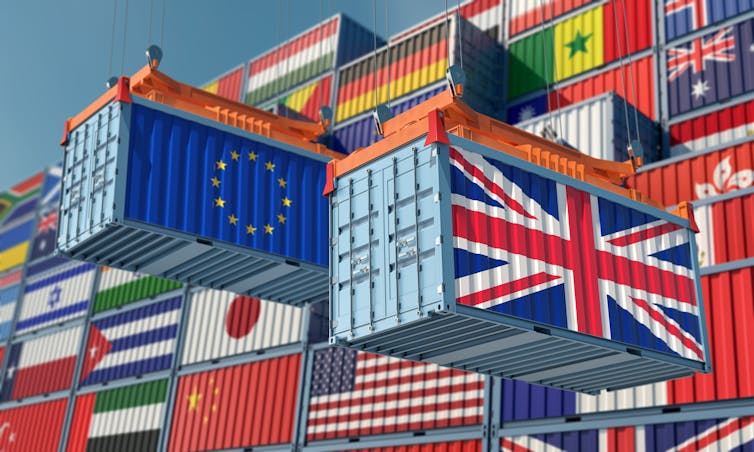
The poet TS Eliot famously proclaimed April to be the “cruellest month”. Writing after surviving a pandemic – the Spanish flu of 1918 – he was referring to the familiar (often misguided) sense of hope that traditionally accompanies the arrival of spring.
From an economic perspective, April 2022 looks like it will be especially cruel. For despite the seasonal flowers and fairer weather, the cost of living crisis casts a gloomy cloud over millions of UK households.
Many face a huge rise in national insurance contributions. Personal tax allowances begin a four-year freeze, which will not be altered in line with inflation, and will drag more workers into higher tax bands.
April will also see the arrival of council tax bills that are likely to have gone up much more than in recent years. And while some people will be offered a £150 rebate, overall the UK tax burden is set to rise to its highest level in over 70 years.
Added to this is the UK’s highest level of inflation in over 30 years. One contributing factor will be a 54% increase in the domestic energy price cap in April, meaning a rise of nearly £700 for the average household. The war in Ukraine and the associated threat to oil and gas supplies from Russia to Europe are also likely to push wholesale energy prices even higher.
There have long been concerns about UK energy security and supply. Yet poor policy choices and inaction over the last decade in particular have meant the UK is left with some of the lowest energy storage capacity in Europe. Moreover, the fragmented UK energy market is itself a product of ill-conceived privatisation reforms in the 1980s and 1990s. In contrast, the French state-owned energy supplier, EDF, has had to restrict the current rise in heating bills to a mere 4%.
April then, looks pretty grim for many households, and politically quite dangerous for the government. As we saw after the financial crisis of 2008, governments presiding over falling living standards don’t tend to survive very long. And the UK’s economic performance over the last 12 years has been poor.
Over the last decade, UK economic growth has been anaemic. Between 2010 and 2019 and before the pandemic hit, GDP per capita growth averaged under 1.2% a year in the UK - less than half of what was achieved in the decade preceding the financial crisis. In addition, average real wages have yet to recover from the financial crisis, and are expected to remain below their 2008 level until at least 2026. This is the longest squeeze on UK incomes in over 200 years.
Added to this, Brexit has been a drag on the UK economy since the 2016 referendum, with sterling, trade and investment falling significantly. By the time the UK left the EU in January 2020, the hit to GDP had been of the order of 2%-3%.
Lost trade and growth means Brexit is expected (by the Tony Blair Institute) to mean a net cost to the Exchequer of around £30 billion a year – around the same sum to be collected by all of the recent tax rises. Meanwhile, the UK suffered the largest economic contraction of the G7 nations as a result of COVID.
Lessons learnt?
Politically, then, the cost of living crisis should be an open goal. Labour’s shadow chancellor, Rachel Reeves, made much political capital over the Conservatives’ economic record in her spring statement response. Yet just offering to be more competent on the economy than the government is not enough.

Labour needs to set out a compelling and positive vision as to how it will seek to shape the UK economy. So far, there has been very little in terms of an alternative economic strategy, save for advocating a “buy British” state procurement policy.
This is reminiscent of former prime minister Harold Wilson’s “I’m backing Britain” campaign of 1968, which sought to encourage UK workers to become more productive and consumers to buy British goods. The campaign quickly fizzled out, and a similar policy today is fraught with difficulties. It is inherently a protectionist stance, likely to contravene World Trade Organization rules and lead to retaliatory trade barriers.
Labour also wishes to stick to the Brexit deal, under the slogan “Make Brexit Work”. But the evidence suggests Brexit is acting as a slow drag on the UK economy, adding substantial red tape, costs and delays to British business.
Yet Labour has never been a leader on the European question; since the 1950s, it has left it to the Conservatives to determine the direction of travel. But a failure to change the narrative means that a future Labour government is unlikely to be able to deliver on its own objectives.
Indeed, if Labour does assume power after the next election – and its most likely route is as a minority government – it will inherit a failing economy not too dissimilar to the one it took over in 1974. What followed back then was a period of stagflation – and two cruel decades of relatively high inflation and chronically high unemployment.
David Bailey receives funding from the Economic and Social Research Council's UK in a Changing Europe programme.
Phil Tomlinson currently receives funding from the Engineering and Physical Sciences Research Council (EPSRC) for the Made Smarter Innovation: Centre for People-Led Digitalisation.
This article was originally published on The Conversation. Read the original article.







